
MEDICAL MICROBIOLOGY AND IMMUNOLOGY
Scope & Guideline
Exploring the dynamic world of microorganisms and immune responses.
Introduction
Aims and Scopes
- Infectious Disease Mechanisms:
Research exploring the biological mechanisms underlying various infectious diseases, including host-pathogen interactions and the immune response. - Diagnostic Innovations:
Development and evaluation of new diagnostic tools and methodologies for the detection of pathogens, including PCR-based tests and rapid antigen assays. - Antimicrobial Resistance:
Investigations into the mechanisms of resistance in bacteria and other pathogens, including the identification of resistance genes and the effectiveness of new antimicrobial agents. - Vaccine Development and Immunotherapy:
Studies focusing on the development of vaccines and immunotherapeutic approaches against infectious diseases, including the evaluation of immune responses. - Clinical and Analytical Microbiology:
Clinical studies that analyze microbial infections, their epidemiology, and implications for public health, including serological and genetic studies. - Fungal and Parasitic Infections:
Research on emerging fungal and parasitic pathogens, their virulence factors, and the immune responses they elicit.
Trending and Emerging
- COVID-19 Research:
A significant increase in publications related to COVID-19, including studies on immune responses, variants, and the effectiveness of diagnostics and vaccines, highlighting the pandemic's impact on research priorities. - Host-Pathogen Interaction Studies:
Growing interest in understanding the complex interactions between host immune systems and pathogens, leading to insights that could inform therapeutic strategies. - Emerging Infectious Diseases:
A focus on new and re-emerging infectious diseases, such as those caused by novel viruses and fungal pathogens, reflecting the need for ongoing vigilance in infectious disease epidemiology. - Microbiome Research:
An increasing number of studies examining the role of the microbiome in health and disease, particularly its interactions with infectious agents and implications for immunity. - Immunotherapy and Vaccine Development Advances:
Emerging research on innovative vaccine platforms and immunotherapeutic strategies, including multi-epitope vaccines and personalized immunotherapies, indicating a shift towards more targeted treatments.
Declining or Waning
- Traditional Microbial Pathogenesis Studies:
Research that primarily focuses on classic models of microbial pathogenesis has become less frequent, as newer methodologies and interdisciplinary approaches gain traction. - Non-viral Infectious Disease Research:
Topics related to non-viral pathogens, such as certain bacterial infections that were previously highlighted, are being overshadowed by the increasing focus on viral infections, especially in the context of the COVID-19 pandemic. - Basic Immunology Studies:
Basic immunological research without direct clinical applications has seen a decline, as the journal increasingly prioritizes studies with immediate relevance to clinical practice or public health.
Similar Journals

MICROBIOLOGY AND IMMUNOLOGY
Advancing Knowledge in Microbiology and ImmunologyMICROBIOLOGY AND IMMUNOLOGY, an esteemed journal published by WILEY, serves as a vital resource for researchers and professionals in the fields of microbiology, immunology, and virology. With its ISSN 0385-5600 and E-ISSN 1348-0421, this journal has been a cornerstone in scientific literature since its inception in 1977, bridging decades of research and innovation through its comprehensive coverage of emerging trends and discoveries. Although this journal operates without open access, it maintains a commendable presence in academic circles, reflected in its 2023 Quartile rankings of Q3 across the categories of Immunology, Microbiology, and Virology. As part of an important discourse in these disciplines, MICROBIOLOGY AND IMMUNOLOGY ensures its scholarly contributions are relevant to both seasoned researchers and emerging scholars. Positioned in a competitive journal landscape, with Scopus ranks indicating a median percentile across its fields, it remains committed to advancing knowledge through peer-reviewed articles, thereby supporting the continuous evolution of its focus areas. The journal's current scope encompasses topics critical for understanding pathogen-host interactions and the immune response, making it a crucial publication for any academic library or individual scholar dedicated to the biological sciences.
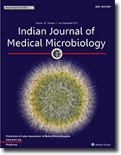
Indian Journal of Medical Microbiology
Your Gateway to Open Access Microbiological ResearchIndian Journal of Medical Microbiology, published by Elsevier, is a pivotal peer-reviewed journal dedicated to the field of medical microbiology, providing a vital platform for research and scholarship since its inception in 1986. With an Open Access model established in 2001, it ensures the dissemination of scientific knowledge to a global audience, enhancing accessibility for researchers, professionals, and students alike. The journal's scope spans critical areas including immunology, infectious diseases, and microbiology, with an impressive trajectory marked by converged years of publication allowing for a comprehensive exploration of evolving scientific trends. As of 2023, the journal holds a Q3 ranking in Infectious Diseases and Microbiology (medical) and a Q4 ranking in Immunology and Microbiology categories, reflecting its significant yet growing impact in the field. Researchers seeking to contribute to or stay updated on the latest advancements in medical microbiology will find the Indian Journal of Medical Microbiology a valuable resource, as it consistently bridges the gap between emerging science and clinical application.
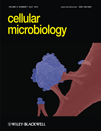
CELLULAR MICROBIOLOGY
Exploring the Intricacies of Immunology and MicrobiologyCELLULAR MICROBIOLOGY, published by Wiley-Hindawi, is a prominent journal in the fields of Immunology, Microbiology, and Virology. With its ISSN 1462-5814 and E-ISSN 1462-5822, this journal serves as a vital platform for researchers to disseminate their findings and contribute to the growing body of knowledge surrounding cellular interactions and microbial processes. Operating from the United Kingdom, CELLULAR MICROBIOLOGY has distinguished itself by ranking in the top quartile of Microbiology (Q1) and maintaining a solid Q2 status in both Immunology and Virology as of 2023. The journal has also demonstrated excellent performance in Scopus rankings, boasting significant percentiles in its respective categories. Although primarily subscription-based, the journal aims to continuously advance the understanding of cellular microbiology through rigorous peer-reviewed research spanning from 1999 to 2024. Researchers, professionals, and students alike will find this journal an invaluable resource for the latest scientific breakthroughs and theoretical advancements in the microbiological and immunological realms.
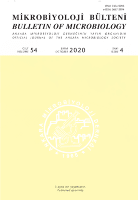
MIKROBIYOLOJI BULTENI
Pioneering Insights in Immunology and MicrobiologyMIKROBIYOLOJI BULTENI, with ISSN 0374-9096, is a prestigious academic journal published by the ANKARA MICROBIOLOGY SOC, located in Ankara, Turkey. Established in 1973, this journal has been a vital conduit for disseminating research in the fields of Immunology, Microbiology, and Infectious Diseases, garnering a reputation as a significant contributor to the scientific community. The journal is currently ranked in the Q3 category within Immunology and Microbiology (miscellaneous), and Infectious Diseases, indicating its impactful presence amidst contemporary research. With access options that may be restricted, MIKROBIYOLOJI BULTENI actively welcomes submissions that advance the understanding of critical microbiological principles and practices, thereby supporting both national and international research efforts. Researchers, professionals, and students are encouraged to explore the latest findings shared in this journal, as it continually shapes the landscape of microbiology and infectious disease studies through its comprehensive and rigorous peer-reviewed publications.

INFECTION AND IMMUNITY
Empowering Researchers with Cutting-Edge DiscoveriesINFECTION AND IMMUNITY is a distinguished peer-reviewed journal published by the American Society for Microbiology, focusing on groundbreaking research in the fields of infection, immunology, microbiology, and parasitology. Established in 1971, this journal has built a robust legacy, converging years of scientific discovery with a vision towards 2024 and beyond. With an impressive Impact Factor, the journal holds significant rankings in various categories; its Q1 status in both Infectious Diseases and Parasitology underscores its high relevance and quality within the scientific community. Researchers and professionals alike will benefit from its content, as it promotes the latest advances in understanding immune responses and infectious agents, further legitimizing its place among the top quartiles of its respective fields. Access options are provided through traditional subscription models, ensuring a broad charitable dissemination of knowledge. As a pivotal resource for scholars and practitioners alike, INFECTION AND IMMUNITY stands at the forefront of microbiological and immunological research, fostering essential discourse that is crucial for advancing public health and scientific insight.

Microbiology Research
Exploring the Microbial Universe, One Study at a TimeMicrobiology Research, published by MDPI, stands as a pivotal open-access journal in the field of microbiology, having established its presence since 2010. Based in Switzerland, this journal strives to provide a platform for innovative research and cutting-edge findings in various branches of microbiology, including medical microbiology and molecular biology. With an impact factor that reflects its dedication to scholarly excellence, Microbiology Research is classified in the Q3 category for both microbiology and medical microbiology, and Q4 for molecular biology as of 2023, indicating its growing importance and outreach within these domains. The journal aims to foster discussion and collaboration among researchers, professionals, and students by presenting articles that cover a wide array of topics and methodologies in microbiological research. Leveraging its open-access model, Microbiology Research ensures that high-quality research is accessible to a global audience, thus facilitating the advancement of knowledge and innovation in the microbial sciences.
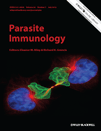
PARASITE IMMUNOLOGY
Transforming Understanding of Parasitic Diseases.PARASITE IMMUNOLOGY, published by Wiley, is a leading journal in the field of immunology and parasitology, with an ISSN of 0141-9838 and E-ISSN of 1365-3024. Since its inception in 1979, it has played a pivotal role in advancing our understanding of host-parasite interactions, immunological responses to parasitic infections, and the mechanisms of immunological resistance. The journal is adeptly positioned within the academic community, currently holding a prestigious Q2 ranking in Parasitology and a Q3 ranking in Immunology for 2023, indicating its significant influence and relevance. Its comprehensive scope attracts a diverse readership, contributing to the discourse surrounding novel therapeutic approaches and emerging challenges in parasitic diseases. With a consistent convergence of research until 2024, PARASITE IMMUNOLOGY is an essential resource for researchers, professionals, and students seeking to deepen their knowledge and foster collaboration in these dynamic fields. Although it is not an open-access journal, the insights shared within its pages are invaluable for shaping future research trajectories.
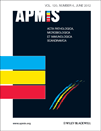
APMIS
Unveiling Groundbreaking Insights in Immunology and MicrobiologyAPMIS is a distinguished academic journal published by WILEY that serves as a vital resource for researchers and practitioners in the fields of Immunology, Allergy, Microbiology, and Pathology. Established in 1988 and continuing its mission through 2024, this journal facilitates the dissemination of high-quality research findings, contributing to the intersection of multiple disciplines within the medical sciences. With an ISSN of 0903-4641 and an E-ISSN of 1600-0463, APMIS is categorized in 2023's Q2 and Q3 quartiles across various domains, reflecting its significant impact, with rankings such as #50/208 in Pathology and Forensic Medicine and #121/233 in Immunology and Allergy. Although it currently does not offer open access options, the journal’s rigorous peer-review process ensures that published articles maintain the highest standards of scholarship. With its focus on innovative research, APMIS continues to occupy a pivotal role for those seeking to advance their expertise and contribute to scientific dialogue in these essential fields.
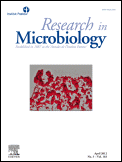
RESEARCH IN MICROBIOLOGY
Unveiling breakthroughs in immunology, molecular biology, and beyond.Research in Microbiology, published by Elsevier, is a prominent academic journal devoted to advancing the field of microbiology, encompassing a diverse array of topics including immunology, molecular biology, and biochemistry. Established in 1987, the journal has expanded its focus over the years, with a commendable impact factor reflecting its relevance and influence in the scientific community. Although it does not currently offer open access options, Research in Microbiology remains a crucial resource for researchers and professionals seeking to stay abreast of the latest findings and methodologies. The journal holds a respectable Q2 ranking in Medicine (miscellaneous) and a Q3 ranking in both Microbiology and Molecular Biology for 2023, highlighting its position within the scholarly landscape. With its base in France and accessible to a global audience, Research in Microbiology continues to foster scholarly exchange, making it an essential platform for the dissemination of impactful microbiological research.

Infectious Diseases
Connecting Scholars in the Battle Against Infectious DiseasesInfectious Diseases, published by TAYLOR & FRANCIS LTD, is a leading academic journal dedicated to advancing research in the field of infectious diseases and microbiology. With an impressive impact factor and categorized in Q1 in multiple areas including Immunology and Microbiology, this journal serves as a critical platform for researchers, practitioners, and students to disseminate their findings and stay abreast of current advancements. The journal is recognized for its rigorous peer-review process and aims to foster innovation and collaboration across disciplines from 2015 to 2024. It boasts a robust Scopus ranking, positioning it favorably among the top-tier of journals in the relevant fields, making it an essential resource for anyone involved in infectious disease research. Access options are available, ensuring that the latest research is accessible to a global audience, thus emphasizing the journal's commitment to promoting knowledge and understanding in the ever-evolving landscape of infectious diseases.